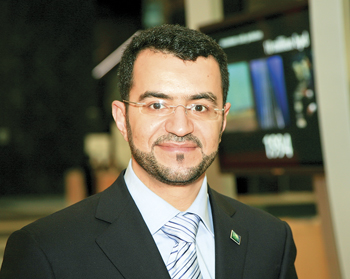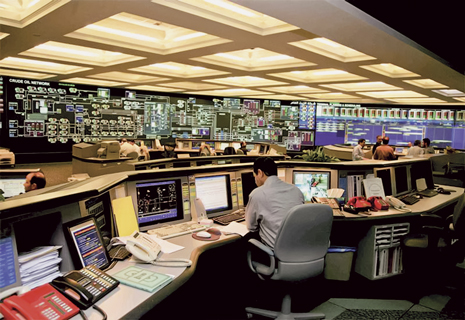Innovative thinkers
Saeed Mubarak: Intelligent fields: The norm not the exception
|
Saeed Mubarak
Growing up in eastern Saudi Arabia, Saeed Mubarak, Saudi Aramco Intelligent Field Team Leader, saw the impact of the oil and gas industry on a very personal level, living among some of the world’s largest oil fields, operated by Saudi Aramco. “When I was a child, I thought one day I would be an Aramcon engineer and that’s what exactly happened,” Mubarak said. After receiving a BS degree in chemical engineering from King Fahd University of Petroleum & Minerals, Mubarak began his career working for Saudi Aramco in reservoir management. “I realized that the journey would be different, and I needed to adjust accordingly, but I discovered that engineering is a process of thinking that can be easily adapted,” he said. “Instead of working in the downstream, I worked in the upstream; and that was the beginning of my journey with the field of oil and gas.” While the need for developing hydrocarbon resources economically was climbing, Mubarak remembers the challenges that came with the technological gaps at the time, starting with the introduction of Windows 3.1 his graduating year. “At the time, we were using mainframe stations. The transition from mainframe to Windows was a big change and faced resistance, as it is the case with the introduction of any change,” Mubarak said. “I still remember how I became expert in using LOTUS 123 and when Office came, we had to change to Excel. Imagine that you do not have email.” The advancements in drilling operation, formation evaluation and communication technologies have significantly evolved. “I still remember the time I spent on drilling sites, the “music” of the drill bits drilling through certain formations; I still remember those hand-held devices used to analyze crude samples. That was the norm during those days.” Whereas vertical completions were the standard, and perceived as the only feasible option back then, they are now replaced by horizontal and multilateral wells with advanced completions—all managed from remote geo-steering centers, through advanced real-time formation evaluation solutions and sophisticated communication systems that allow multidisciplinary teams to monitor and manage multiple operations simultaneously.” Mubarak began looking at new ways to improve field efficiency. Three years into his career at Saudi Aramco, he conceptualized the “conservation of reservoir energy” strategy, which involved creating comprehensive assessments about a field’s water management. In 1998, three years after the concept’s introduction, it was adapted successfully in several large fields. “This strategy has resulted in significant improvement in wells and reservoir performance and production capabilities,” he said. In 2003, and with a passion for process control while working the second increment of Haradh field, Mubarak studied intelligent fields, and how real-time data could enhance reservoir management. He began to exploit data-driven and analytical models for real-time data that were streaming from downhole and surface sensors. “The concept of an intelligent field is not really new. Many technologies and processes have been adopted into our business from the downstream industry,” he said. Just one year later, Mubarak was able to witness the first implementation of an intelligent well—and modern ‘intelligent field’, operated by Saudi Aramco. “That unique experience provided special learning opportunities and insights into the effectiveness, capabilities, limitations and applications of these technologies and it has opened doors for future advancements and inventions.” In 2005, during his assignment with ChevronTexaco Energy Technology Company in Houston, Mubarak successfully developed an innovative tool to automatically compare and visualize hundreds of wells’ RFT measurements with the simulation pressures. The tool allowed engineers to compare 300+ wells’ RFT data with simulation data. That was a capability that was thought impossible. Mubarak is equally proud of his involvement in the development of the technology behind the modern intelligent field, as he gained access to the knowledge for developing fit-for-purpose strategies in field optimization. “This exposure opened new horizons and made innovation as the norm. The involvement in intelligent wells/field projects led me to introduce new concepts and innovations,” Murabak said. “I introduced a new definition and concept for ‘real-time reservoir management’ (RTRM), [a] new design of downhole valves that improves their efficiency. This proposed design was implemented by most providers.” While serving as Saudi Aramco’s Reservoir Management supervisor and RTRM specialist, Murabak was granted a U.S. patent for his downhole valve, which was capable of preventing zonal cross-flow. Mubarak also continued to actively participate in key company projects, including cross-well and Wellbore-to-Surface resistivity, VSP walk-away and walk-around projects, and extended-reach wells with new-generation advanced completions. “We say in Arabic, rain starts with the first drop, and a journey starts with the first step. More rain drops followed, such as passive downhole power generation, advanced communication kits for intelligent fields, and trackers of downhole contacts for gas/oil/water.” Currently, Mubarak is the Saudi Aramco Intelligent Field Team leader, where he sets and implements customized strategies, develops next-generation intelligent field solutions, and conducts technology integration, real-time data management and analysis, and develops decision tools and best practices. Mubarak believes that collaboration is essential, as is a focused passion on making the perceived impossible a reality today. And he certainly puts his philosophies into action. Between interacting with over 2,000 experts on his LinkedIn discussion site about intelligent field and well technology, and running a 30-session professional training program called “Let’s Learn Intelligent Fields,” he still finds ways to connect people on a humanitarian level. When a session attendee discussed blood donation as part of his five-minute speech about overcoming a fear of speaking openly at meetings, Murabak suggested holding the next weekly meeting at the blood bank. Initially, seven members donated blood—within two years, over 100 employees donated blood, many of whom became regular donors.
As for the future of the intelligent field, Mubarak believes that the next big advancements are not too far ahead. “I will begin with what is perceived as impossible, and that is approaching 100% recovery of hydrocarbons in the most efficient, safest and economical way. I would need superior monitoring capabilities beyond conventional means to characterize my reservoir and fluid dynamics; I would need excellent modeling and forecasting solutions to appropriately set production plans and development strategies; and I would need controlling capabilities of rock and fluids to be able to extract the last moleculae of hydrocarbons. The next advancements will be in extending reservoir monitoring capabilities beyond current technologies.” He also believes that real-time technology is on the cusp of big change. “There will be a great potential use of data-driven models and artificial intelligence, in various aspects of not only downstream, but also upstream, including surveillance, informed and predictive operations and optimizations considering both short and long-term objectives of operators,” Mubarak said. Mubarak sees a very promising future ahead in furthering the capabilities of the intelligent field and has learned a lot about what it takes to accomplish the impossible. “I have learned the secret. The secret is in you, as it translates in your life as the virtue of the images you are holding in your mind. Think positively and focus intently, then like a magnet, you will be attracting things youre passionate about,” he said. In referencing one of his favorite quotes by Andre Gide—“One does not discover new lands without consenting to lose sight of the shore for a very long time”—Mubarak encourages young adults to see the their potential in driving the next wave of technological advancements. “The quality of life we have today is a result of cumulative efforts of people from different times and different places. You have the potential to contribute to the advancement of civilization and society, and you have the potential to remain. It simply remains for you to make the decision to plant trees for your successors to harvest.” In 2012, he was awarded the World Oil Innovative Thinker Award.
|
- Oil and gas in the Capitals (February 2024)
- What's new in production (February 2024)
- U.S. operators reduce activity as crude prices plunge (February 2024)
- U.S. producing gas wells increase despite low prices (February 2024)
- U.S. oil and natural gas production hits record highs (February 2024)
- Dallas Fed: E&P activity essentially unchanged; optimism wanes as uncertainty jumps (January 2024)




